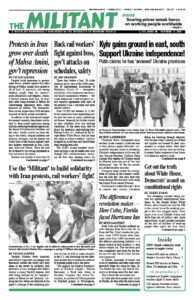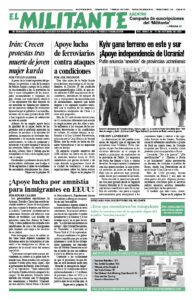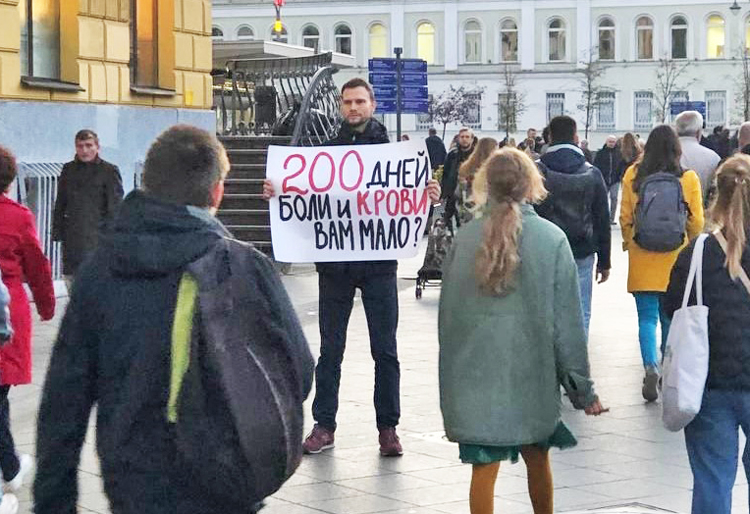Ukrainian forces reconquered more territory in the country’s south and east as they advance against Moscow’s seven-month invasion aimed at destroying Ukraine’s independence. As his war falters, Russian President Vladimir Putin claimed four regions of Ukraine seized by Moscow were now part of “our vast Motherland” Sept. 30. But he controls less of that territory each day.
Ukrainian troops retook the strategic town of Lyman in the country’s northeast the next day. Two days later they broke through Russian lines south along the Dnipro River toward Kherson.
Determined to defeat Moscow’s drive to conquer their country, Ukrainian forces are breaking through demoralized Russian troops running out of food and supplies and treated by their commanders as cannon fodder. Most don’t want to be in a foreign land and willingly retreat. Putin’s response to their losses is to blame his military chiefs.
The Kremlin decided to annex the Donetsk, Luhansk, Zaporizhzhia and Kherson regions in Ukraine following sham referenda held at gunpoint in some areas last month. But even Putin spokesman Dmitry Peskov had to admit they don’t really know what are the borders of these areas Russia controls. They change daily as Ukraine advances. The Ukrainians are highly motivated, while Russian troops are not.
Russian authorities at Vasylivka in southern Ukraine are trying to build a “state border,” extending the Russian frontier and imposing a “visa” application process for anyone trying to get out. Long lines to leave are forming in towns “incorporated” into Russia. It took 19-year-old Maksym Bezhan, his family and their cat four days to travel out of the Moscow-occupied area they come from near Berdyansk in the south.
“After the invasion,” he told the BBC, “I became very pro-Ukrainian.”
Putin’s Sept. 21 decree calling up the first major military mobilization in Russia since World War II triggered demonstrations in cities all across Russia. Despite police beatings and mass arrests, smaller protests around the country continued for a second week.
Resistance to mobilization remains strong even as over a quarter million fighting-age men fled across Russia’s borders, nearly 100,000 into Kazakhstan alone. Among many who did answer the call-up, thousands have been sent home as “unfit for duty.”
The Moscow Times interviewed veterans opposed to the war. Putin “created circumstances in which we cannot win,” Vitaly Votanovsky, a retired air force officer from Krasnodar, told the paper Oct. 3. He “has gotten himself into the war with the entire world.” Votanovsky is often detained as he photographs soldiers’ graves to show the true extent of the country’s losses.
Ukrainians “are my friends and comrades, so I am deeply outraged by what is happening,” said Nikolai Prokudin, a veteran of the Soviet invasion of Afghanistan. “I would of course defend our country. … But only when we are attacked.”
He explained that his life had been saved by a Ukrainian soldier in Afghanistan.
“I saw all those ruined houses in Grozny,” said Igor Knyazkov, a veteran of Moscow’s war in Chechnya. With “what is happening in Ukraine right now and how [the Kremlin chiefs] are trying to take over territories … [it’s clear] we’ll be paying for their mad ideas.”
Pointing to Putin’s deepening problems, H.R. McMaster, a retired U.S. Army general and former national security adviser, said Oct. 3 that the Russian army in Ukraine is on the verge of “a moral collapse.”
Putin expresses his frustration at these developments by targeting urban civilian areas for bombardment. Russian missiles killed dozens in Sept. 30 strikes against a car convoy outside Zaporizhzhia, and on a building in Mykolaiv.
Putin’s speech raises nuclear threat
As his crisis at home deepens, Putin tried to rally support by appealing to all Russians to take a stand against “aggression” from the “collective West.”
In a thinly veiled threat he said a “precedent” was set by the U.S. rulers’ use of “nuclear weapons twice, destroying Hiroshima and Nagasaki in Japan” at the end of the second imperialist world slaughter.
In another repercussion of the war, four simultaneous explosions Sept. 26 damaged Nord Stream 1 and 2 natural gas pipelines from Russia to Europe under the Baltic Sea. Berlin halted the opening of Nord Stream 2 when the war started in reaction to Putin’s war and began seeking alternative energy sources. In retaliation, Moscow shut off supply through the older line.
Putin hoped that choking off Russian gas supplies to Europe could weaken opposition of governments there to his expansionist war.
After the explosions, governments in the U.K., Germany and France immediately offered the Norwegian government military backup to guard against attacks on its vast North Sea oil and gas installations. The role of Oslo as an energy supplier to Europe has grown as Russian imports diminish.
Moscow’s invasion began what is the largest war on European soil since World War II. It has pushed capitalist rulers everywhere to reexamine their alliances, step up their armaments and look afresh at how best to defend their own national interests.


